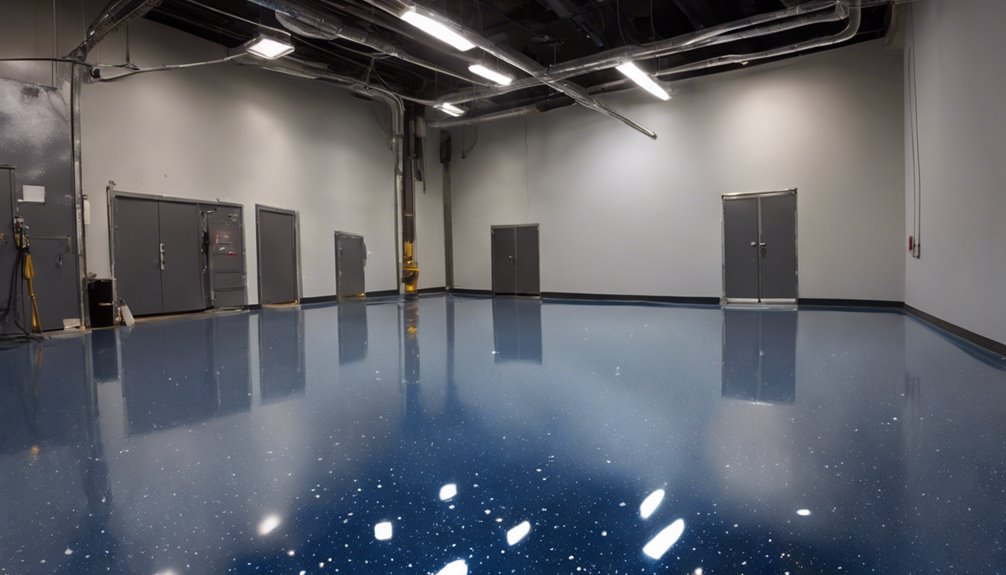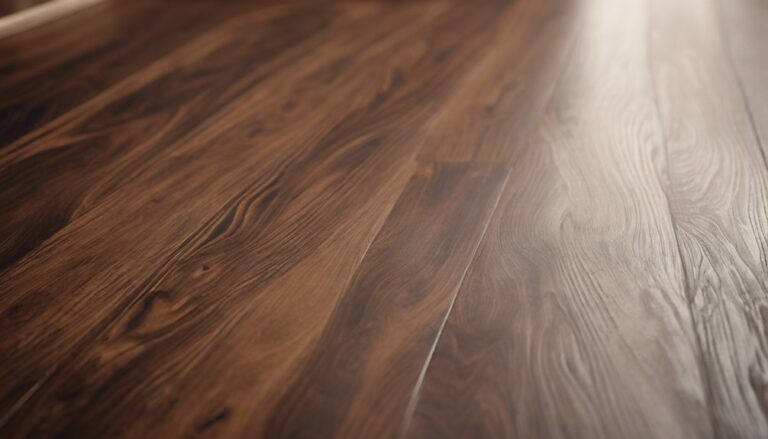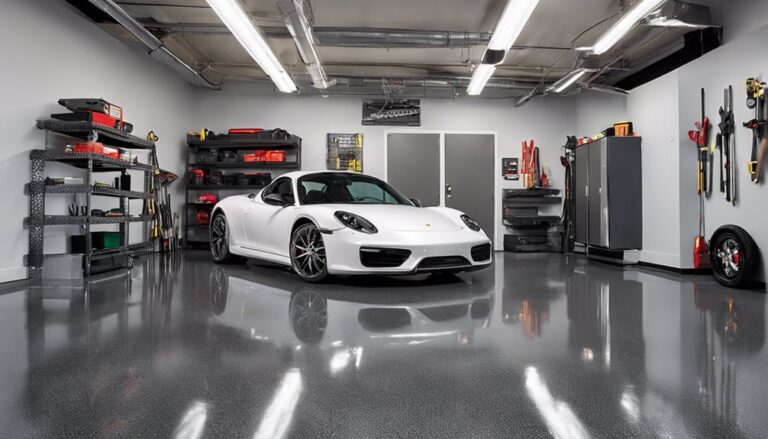Epoxy flooring generally ranges from $3 to $12 per square foot. Several factors influence this cost, such as material quality, installation method, and surface preparation requirements. Standard colors tend to be more affordable than custom blends, and added aesthetic preferences can also drive up expenses. If you're hiring professionals, labor costs will increase your total. Additionally, don't forget to factor in the costs for maintenance products and installation accessories. Investing in quality epoxy can offer long-term value, ensuring durability and low maintenance. To uncover more details about various epoxy types and potential savings, keep exploring your options.
Factors Affecting Cost
When considering epoxy flooring, it's essential to understand that several factors can greatly influence the overall cost. One significant aspect is surface preparation; a well-prepared surface guarantees better adhesion, longevity, and performance of the epoxy coating. If your floor requires extensive repairs or leveling, that'll increase the overall expense. Additionally, the color options you choose can also impact the price. Standard colors are typically more affordable, while custom blends or metallic finishes can elevate costs. Consequently, assess your space's specific needs and your aesthetic preferences. By doing so, you can make an informed decision that balances quality with your budget, allowing you the freedom to create a space that reflects your style and meets durability expectations.
Average Price Range
Epoxy flooring typically ranges from $3 to $12 per square foot, depending on various factors such as the type of epoxy used, the complexity of the installation, and the region where you live. Here's a breakdown of what influences the price:
- Installation methods: DIY vs. professional
- Material quality: Low vs. high-grade epoxy
- Surface preparation: Level of preparation required
- Design complexity: Simple vs. intricate patterns
- Geographic location: Availability of services in your area
Understanding these elements helps you make informed decisions, ensuring you get the best value for your investment. Keep in mind that while lower costs might be tempting, higher material quality and professional installation can lead to longer-lasting results.
Types of Epoxy Flooring
Choosing the right type of epoxy flooring can greatly impact both the aesthetics and durability of your space. Here's a breakdown of popular epoxy types you might consider:
| Type of Epoxy Flooring | Key Features | Color Options |
|---|---|---|
| 1. Solid Epoxy Coatings | High durability | Extensive colors |
| 2. Metallic Epoxy | Unique shimmer | Custom blends |
| 3. Flake Epoxy | Textured surface | Various combinations |
| 4. Self-leveling Epoxy | Smooth finish | Wide range |
| 5. Epoxy Mortar | Heavy-duty | Limited options |
Each of these epoxy coatings offers unique benefits. Be sure to explore the color options to match your design vision while ensuring your flooring stands up to wear and tear.
Additional Costs to Consider
While selecting the right epoxy flooring is essential, you also need to account for additional costs that can greatly influence your overall budget. These costs can sneak up on you, so it's vital to understand them:
- Surface preparation materials (grinders, fillers)
- Installation accessories (rollers, mixers)
- Labor costs (if hiring professionals)
- Additional coatings (for enhanced durability)
- Maintenance products (cleaners, sealants)
Surface preparation is particularly important; if the substrate isn't properly prepped, it can lead to premature failure of the epoxy. Additionally, installation accessories are often overlooked but can add up quickly. By considering these factors, you'll guarantee your project stays within budget while achieving the quality finish you desire.
DIY vs. Professional Installation
When considering epoxy flooring, you might find yourself weighing the pros and cons of DIY installation versus hiring a professional. Both options have their merits, primarily revolving around installation techniques and cost comparison.
| Aspect | DIY Installation |
|---|---|
| Cost | Lower upfront expenses |
| Skill Requirement | Requires research and practice |
| Time | Can be time-consuming |
If you're handy and willing to invest time, DIY can save money. However, professional installers bring expertise, ensuring a flawless finish and quicker installation, potentially minimizing long-term maintenance issues. Ultimately, the choice depends on your budget, skills, and how much time you're willing to commit.
Long-Term Value of Epoxy Flooring
When considering epoxy flooring, its durability and longevity are key factors that can greatly enhance your investment. You'll find that this flooring type withstands heavy traffic and harsh conditions, minimizing the need for frequent replacements. Additionally, the low maintenance costs associated with epoxy surfaces can lead to substantial savings over time, making it a financially sound choice for both residential and commercial spaces.
Durability and Longevity
Although many flooring options may deteriorate over time, epoxy flooring stands out for its exceptional durability and longevity, making it a wise investment for both residential and commercial spaces. Here are some notable epoxy advantages that contribute to its impressive flooring lifespan:
- High resistance to wear and tear
- Ability to withstand extreme temperatures
- Protection against chemicals and stains
- Non-porous surface that reduces moisture damage
- Easy to clean and maintain over time
Choosing epoxy flooring means you're opting for a solution that can last for decades with proper installation. Unlike traditional flooring, epoxy's robust nature guarantees that your investment will endure heavy foot traffic and harsh conditions, ensuring you enjoy its benefits for years to come.
Maintenance Cost Savings
While many flooring options require regular upkeep and repairs, epoxy flooring considerably reduces maintenance costs over time, enhancing its long-term value. The seamless surface of epoxy minimizes dirt accumulation, making cleaning straightforward and less frequent. You won't need to invest in costly waxing or special cleaning products, maximizing your cost efficiency. Additionally, its resistance to stains, chemicals, and abrasions means you're less likely to face repair expenses, providing significant maintenance benefits. Over the years, these savings can accumulate, allowing you more freedom to allocate your budget elsewhere. When considering long-term investments, the maintenance cost savings of epoxy flooring stand out, making it a smart choice for those looking for both durability and financial prudence.
Frequently Asked Questions
How Long Does Epoxy Flooring Typically Last?
Epoxy flooring typically lasts between 10 to 20 years, depending on several factors. When considering epoxy longevity, it's essential to factor in the quality of installation, the type of epoxy used, and the level of foot traffic. High-quality epoxy provides excellent flooring durability, resisting stains, chemicals, and wear. To maximize its lifespan, guarantee proper maintenance and avoid exposing it to harsh conditions. With proper care, you can enjoy a resilient surface for years.
Can Epoxy Flooring Be Installed Over Existing Flooring?
Yes, you can install epoxy flooring over existing flooring, but there are specific installation requirements you'll need to follow. First, verify the existing surface is clean, dry, and structurally sound. Flooring compatibility is essential; epoxy adheres best to concrete, wood, and certain types of vinyl. However, if your existing flooring has moisture issues or is uneven, it's best to address those before proceeding to guarantee a durable and long-lasting finish.
Is Epoxy Flooring Suitable for Outdoor Use?
Epoxy flooring can be suitable for outdoor use if it's specifically formulated for outdoor durability and weather resistance. These specialized epoxy coatings can withstand harsh elements like UV rays, moisture, and temperature fluctuations. However, not all epoxy products are designed for outdoor conditions, so you'll need to choose wisely. By selecting the right type, you can enjoy a long-lasting and aesthetically pleasing surface that enhances your outdoor spaces while providing the freedom to explore.
What Colors and Designs Are Available for Epoxy Flooring?
When it comes to color options for epoxy flooring, you've got a wide array to choose from, including solid colors, metallics, and even custom blends. Design patterns can range from simple speckled looks to intricate marbled effects, allowing for a unique finish that reflects your style. You can also incorporate stencils or logos for a personalized touch. This versatility guarantees your flooring not only serves a purpose but also enhances your space's aesthetic appeal.
Does Epoxy Flooring Require Special Maintenance?
Yes, epoxy flooring does require special maintenance to keep it looking great. For effective epoxy care, clean spills immediately to prevent staining, and use a pH-neutral cleaner for routine cleaning. Avoid harsh chemicals that could damage the surface. Additionally, consider applying a fresh coat of epoxy every few years to maintain its shine and durability. By following these maintenance tips, you can guarantee your flooring stays functional and visually appealing for years.




